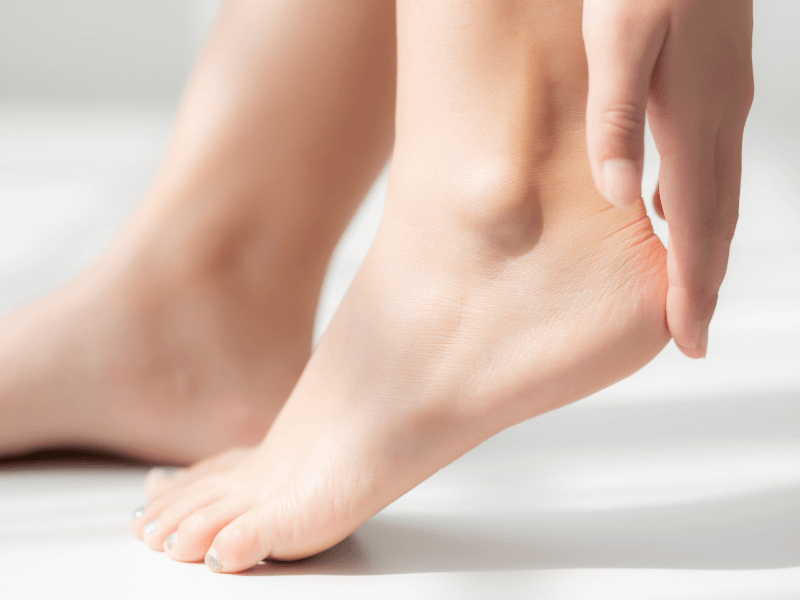Hard skin on feet is a common, often minor issue that you may be able to treat yourself. However, you should see a chiropodist for professional treatment if your hard skin doesn’t respond to foot care at home, you experience worrying symptoms such as pain or you have diabetes or another condition that increases your risk of complications when you have a foot problem.
Our London chiropody team has the expertise to resolve and prevent hard skin issues. Simply contact us today and take your first step towards happier feet!
Hard Skin Means Feet Are Under Pressure
Healthy skin is soft, supple and smooth. By contrast, hard skin is tough, inflexible and rough due to hyperkeratosis. This means your body makes too much keratin, the protein in your skin’s outer layer that acts like a shield, and that layer gets increasingly thick and tough as a result. Hyperkeratosis occurs when your feet are exposed to excessive pressure or friction on a regular basis. It’s a defence mechanism – your body is trying to better protect your feet by making skin hard.
Unfortunately, this creates more problems than it solves. Hard skin is rigid, uncomfortable, prone to cracking and infections, and impairs your feet’s ability to feel things. It requires urgent attention. ‘Proper care and treatment are essential not only for relieving discomfort but for maintaining overall foot health,’ says skincare brand Nivea’s hard skin guide.
Hard Skin Creates Calluses and Corns
If you have hyperkeratosis, the build-up of hard skin can create calluses and corns on your feet’s pressure points (the parts that bear the most weight or rub against shoes):
- Calluses are flat, yellowish patches of hard skin. They typically appear on the balls of feet and heels.
- Corns are small, yellowish lumps of hard skin, often with a core of dead skin. They typically appear on the tops/sides of toes.
Calluses can lead to discomfort and a burning sensation, while corns often cause sharp pain, so you shouldn’t ignore them. Remember you can always visit our chiropody clinics if you have any concerns.
Causes of Hard Skin on Feet
When dealing with hard skin on your feet, you need to identify the source of the excessive pressure/friction and eliminate it.
Common culprits include:
- Shoes that are too tight, narrow or small – they squeeze feet and restrict movement.
- Shoes that are too big or don’t fasten securely – your feet slide around inside when walking.
- Walking barefoot on hard floors – the lack of cushioning takes its toll on bare feet.
- Repetitive, high-impact activities such as dancing or serving customers in busy London restaurants – when feet continually make the same movements, the same areas come under pressure again and again.
- Toe deformities such as hammer toes – the fronts of the feet rub against footwear as they’re an unusual shape.
- Biomechanical issues – having misaligned joints, for example, means your feet don’t work efficiently, and some areas are therefore exposed to excessive pressure.
Removing Hard Skin from Feet at Home
There are steps you can take to remove hard skin from your feet at home and try to get the problem under control:
- Soak your feet in warm water for several minutes to soften calluses and corns.
- Make careful, circular movements over the affected areas with a wet pumice stone to remove dead skin cells.
- Dry your feet, then apply a urea-based foot cream for suppleness. Clean the stone with soap and water.
When You Need Professional Chiropody Treatment
People with stubborn, severe or complex cases of hard skin on their feet need specialist chiropody treatment to resolve the issue.
You should see a chiropodist if:
- Your skin is still hard after treating it at home for a few weeks.
- You have painful calluses/corns.
- Your hard skin cracks (it might also bleed).
- You have symptoms of a foot infection – redness, swelling and pus.
- You’re limping to avoid putting pressure on sore areas or are struggling to perform everyday activities.
- Hard skin appears on a deformed toe.
- Your feet have nerve damage and/or poor circulation due to a condition such as diabetes. You’ll be less aware of any pain and infections, and damaged skin will heal more slowly.
- You struggle to look after your feet due to mobility issues.
Overcome Hard Skin on Feet with 5* London Chiropodists
Our five-star London chiropodists safely and gently remove hard skin, treat cracks and infections, relieve pressure on sensitive areas and improve foot function with custom orthotics, and offer aftercare advice to help you prevent foot problems from recurring.
Overcome hard skin with expert chiropody treatment in London – book an appointment with Feet By Pody today.

